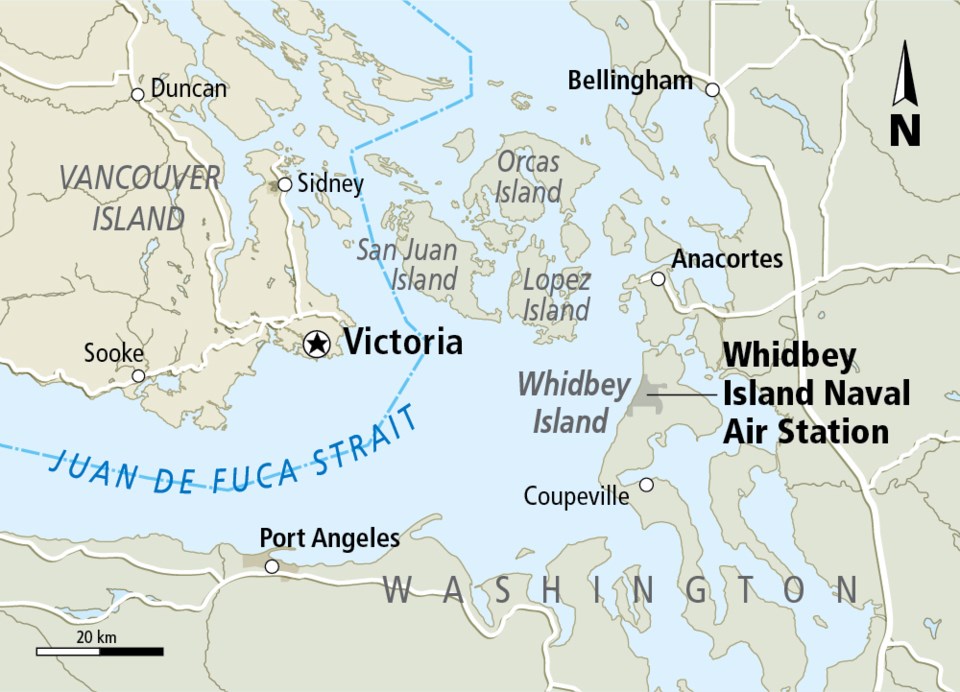SEATTLE — Washington state sued the U.S. Navy on Tuesday over the noise created by the military jets often blamed for the Rumbles — the sonic phenomenon that periodically rattles nerves and teacups in Greater Victoria.
The lawsuit is over the navy’s expansion of jet operations on its base Whidbey Island. The state says officials failed to adequately consider the effect that additional noisy flights would have on people or wildlife.
“The navy has an important job, and it’s critical that their pilots and crews have the opportunity to train,” Attorney General Bob Ferguson said in a news release announcing the lawsuit. “That does not relieve the federal government of its obligation to follow the law and avoid unnecessary harm to our health and natural resources.”
The navy’s public affairs office said it does not comment on litigation.
Victorians have complained about the Rumbles, a low, ominous sound compared to rolling thunder or a heavy truck driving by, since 2009. That’s around the same time Growler electronic attack aircraft replaced the old Prowlers at the navy base.
The location of Whidbey Island, 50 kilometres southeast of Victoria, also aligns with where Vancouver Islanders most often hear the noise: in Oak Bay and along the east side of the Saanich Peninsula.
The navy in March authorized the expansion of its Growler program by up to three dozen jets, adding to the 82 already based on Whidbey Island.
The low-flying jets conduct electronic warfare to jam enemy communications and launch systems, and under the expansion plans crews would perform around 100,000 takeoffs and landings a year for the next three decades.
That, Ferguson said, could have serious effects on nearby residents. The state Health Department has outlined how exposure to noise levels similar to those at Naval Air Station Whidbey Island could disrupt children’s learning and cause sleep disturbance, cognitive impairment and cardiovascular disease.
It could also disrupt the feeding and breeding of eagles and marbled murrelets, a type of seabird.
In the news release, Quinault Indian Nation President Fawn Sharp called on the federal government to strike a balance between national security and environmental preservation.
“Unregulated, unrestrained noise pollution from increased military training operations presents a clear threat to the health and solitude of our state’s fragile ecosystems, treaty protected resources and endangered species,” she said.
In its decision to approve the expansion plan, the navy said the number of flights on the island would be comparable to those that occurred from the 1970s through the 1990s. It also said it would continue to invest in technologies to reduce engine and aircraft noise.
The state’s lawsuit alleges violations of the National Environmental Protection Act and the federal Administrative Procedure Act. Ferguson said he intended to add claims under the Endangered Species Act.
The National Parks Conservation Association said it supports the lawsuit, noting that the flights could also affect Ebey’s Landing, a historical preserve on Whidbey Island, and Olympic National Park, across Juan de Fuca Strait from Victoria. The association recently filed a lawsuit accusing the navy of withholding information about noise pollution from the jets over Olympic National Park.
Navy Secretary Richard Spencer wrote a letter in March to the federal Advisory Council on Historic Preservation, rebuffing its call for additional noise monitoring and tracking of the effect on tourism. He said the navy had already performed noise monitoring and noted it was spending $876,000 to refurbish a home at Ebey Landing built in 1860.


